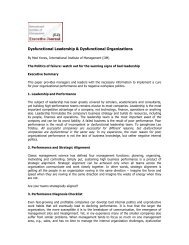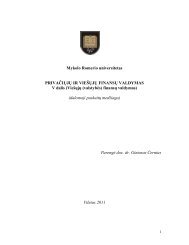Happiness Formulas - Subjective well-being: Institute of subjective ...
Happiness Formulas - Subjective well-being: Institute of subjective ...
Happiness Formulas - Subjective well-being: Institute of subjective ...
Create successful ePaper yourself
Turn your PDF publications into a flip-book with our unique Google optimized e-Paper software.
3-4: Not particularly happy or unhappy. A score <strong>of</strong> 3.5 would be an exact<br />
numerical average <strong>of</strong> happy and unhappy responses. Some <strong>of</strong> the exercises<br />
mentioned just above have been tested in scientific studies and have been<br />
shown to make people lastingly happier.<br />
4: Somewhat happy or moderately happy. Satisfied. This is what the<br />
average person scores.<br />
4-5: Rather happy; pretty happy. Check other score ranges for some <strong>of</strong><br />
my suggestions.<br />
5-6: Very happy. Being happy has more benefits than just feeling good. It’s<br />
correlated with benefits like health, better marriages, and attaining your<br />
goals. Check back – I’ll be writing a post about this topic soon.<br />
6: Too happy. Yes, you read that right. Recent research seems to show that<br />
there’s an optimal level <strong>of</strong> happiness for things like doing <strong>well</strong> at work or<br />
school, or for <strong>being</strong> healthy, and that <strong>being</strong> “too happy” may be associated<br />
with lower levels <strong>of</strong> such things.<br />
2.3 Where are references and further information?<br />
Hills, P., & Argyle, M. (2002). The Oxford <strong>Happiness</strong> Questionnaire: a<br />
compact scale for the measurement <strong>of</strong> psychological <strong>well</strong>-<strong>being</strong>. Personality<br />
and Individual Differences, 33, 1073–1082.<br />
www.iswb.org Page 11




